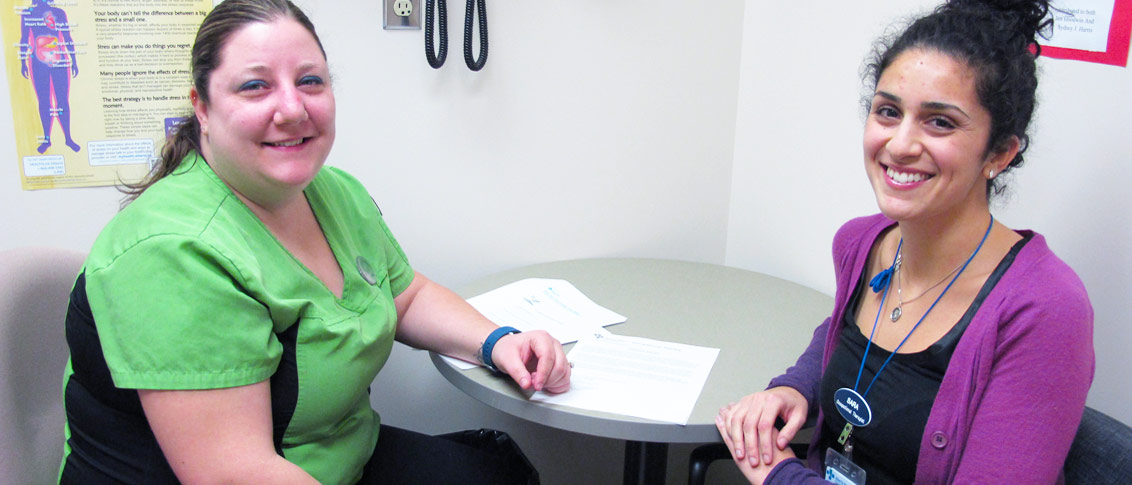
January 27, 2015

Sara Maraj, right, an occupational therapist with Alberta Health Services, leads sleep workshops through the Alberta Healthy Living Program to help participants like Crystal Beck overcome barriers preventing a good night’s sleep.
Story and Photo by Lisa Squires
As a child, Crystal Beck slept like a baby, but sleep became much more elusive as she got older and the stresses of adult life began to creep in – career, finances and family.
“I’d just lay there crying because I couldn’t sleep,” says Beck, 30, who began to notice a change in her sleep habits about six years ago after she started a new relationship and suddenly found herself a stepmom to three children – now aged 14, 13 and 11.
“My brain wouldn’t shut off. I’d lie awake all night thinking about all the things I needed to do. If I did sleep, the quality wasn’t there. I wanted to figure out a natural strategy other than taking sleeping pills or medications.”
According to Alberta Health Services occupational therapist (OT) Sara Maraj, Beck is not alone. A 2011 study of 2,000 Canadians conducted by the National Center for Biotechnology revealed that up to 40 per cent report issues with insomnia, including difficulty falling asleep or staying asleep. And up to one-third of Maraj’s clients are looking for strategies to improve their sleep.
“Sleep is so important and often underrated,” says Maraj, an OT at the Bariatric Specialty Clinic in Medicine Hat, who also teaches sleep workshops with the Alberta Healthy Living Program (AHLP). “Work, rest, play and sleep are the four cornerstones for maintaining optimal health.”
Maraj says stress is one of the biggest factors to impact slumber. Sleep positioning, routine and nightly interruptions from spouses, kids or electronic devices are also wreaking havoc. And research shows poor quality sleep is often linked to chronic conditions including obesity, depression, diabetes and high blood pressure.
Ideally, Maraj says people should aim for six to eight hours of sleep nightly. Any less or more affects the body’s ability to get a good, restorative sleep, which is needed to strengthen the immune system and help with tissue repair, cognitive restoration and memory, and emotional regulation.
“Someone with chronic pain might have difficulty getting into a comfortable position and may wake up during the night due to pain,” says Maraj. “This creates a vicious cycle of decreased sleep which leads to slower physical healing times, and increased pain and tiredness – and the cycle continues. We help clients to identify the root cause, set goals and create an action plan.”
Beck says she’s learned a lot about progressive muscle-relaxation techniques, deep-breathing exercises and how to use meditation and guided imagery.
“I learned about things I was doing to prevent sleep, like watching TV or walking the dog right before bed,” says Beck. “I also didn’t realize I was damaging my sleep by staying up late on the weekends and then sleeping in. You need to create a consistent sleep routine that works for you.”
And although Beck sometimes struggles with sleep, she’s having fewer sleepless nights since she got help.
A doctor’s referral is needed to access the Bariatric Specialty Clinic. Referrals to the Alberta Healthy Living Program can be self-referred or made by physicians and other care providers. AHLP also holds a sleep workshop called How’s Your Sleep? Moving Towards a Healthier Sleep. Participants can join in person or via Telehealth.
For more information, call toll-free: 1-866-795-9709 or visit: ahs.ca/info/Page8930.aspx.
For sleep tips, visit https://myhealth.alberta.ca/health/pages/conditions.aspx?Hwid=aa131396.
How’s Your Sleep? Moving Towards a Healthier Sleep is a free AHS group workshop that highlights the importance of sleep and its impact on health and quality of life. It focuses on lifestyle changes that can help improve the quality and quantity of sleep. Participants will identify challenges to their sleep and will create strategies that can help. The workhop takes 2.5 hours, with a one-hour followup. To register, contact the Alberta Healthy Living Program at 1-866-795-9709 or visit ahs.ca/info/page8930.aspx.